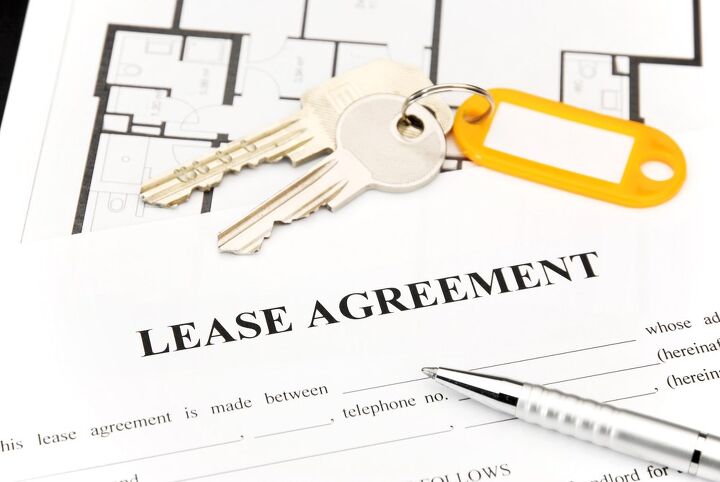Can My Landlord Terminate My Lease Early? (Find Out Now!)

Once you sign a lease, you expect to be in your home for the entire term of the lease. But then, one day, you receive a notice from your landlord that the lease is being terminated early. Can your landlord terminate your lease early?
Your landlord can terminate the lease early for circumstances that are outlined in the lease, such as when the property is sold. Your landlord can also terminate your lease early when you violate the terms of the lease, such as paying rent late or for criminal acts. Your landlord has to give you 30 or 60 days to vacate.
Let’s take a closer look at rental leases and when either party can terminate the lease early.
Do You Need to Hire Movers?
Get free, zero-commitment quotes from pro contractors near you.

What is a Lease?
A lease is a legally binding contract between you and your landlord. The lease gives you the right to occupy the property for a specific amount of time, such as 6 or 12 months. Leases also outline the terms of occupancy for both the tenant and landlord, including rent, pet allowances, fees, rules, and expectations for both parties.
Why is a Lease Important?
Leases are intended to protect the rights and interests of both parties. Well-written leases provide information that tenants need to fulfill their obligations and what they can expect from the landlord. Should their be a legal dispute between the tenant and landlord, the court reviews what is in the lease to decide the case.
Is a Lease the Same as a Rental Agreement?
Rental agreements contain much of the same information as leases. The difference is only in the length of the agreement. A rental agreement is typically for 30 days, and the most common type is a “month-to-month” agreement.
Provisions in Rental Leases
There is no standard format for leases, and this is why things often go awry. At a minimum, a lease should contain certain types of information. If your lease does not have these provisions, ask your landlord for a new lease or lease addendum. The provisions to look for are:
- Correct contact information for all tenants
- Contact information for the landlord
- Type of tenancy and length of the lease
- Rent, deposits, and other fees, including the terms of payment (due date and methods)
- Clause explaining which party is responsible for utility costs
- Extra fees for parking and pets
- Landlord right of entry
- Clauses related to any alterations to damage to the property
- Restrictions on illegal activities and disruptive behaviors
Landlord and Tenant Rights
In a rental situation, the landlord and tenant have rights and responsibilities, and these should be clearly outlined in the lease. If either party violates the rights of the other party or fails to meet the responsibilities, it is considered a breach of the lease. When one party breaches the lease, the other party has the right to terminate the lease early.
What Happens If a Tenant Breaks a Lease?
There are unforeseen situations in which you need to break a lease early. This is where a well-written lease document is crucial. The lease should explain how much notice you need to give and any financial obligations you have when terminating a lease early. If you break your lease early, the landlord may have the right to keep your deposits and require payment for:
- The balance of the lease
- Rent until the unit is leased to another tenant
- One or two additional months of rent after you move out
In addition to the financial obligations with your current landlord, consider the affects on your rental history. Any future landlords will request a reference letter from your previous landlord. Breaking a lease early will be a red flag in the future.
When Can a Landlord Legally Terminate a Lease?
A landlord can terminate a lease early when there are serious violations of the lease agreement. This may include:
- Having a pet when the lease clearly states that pets are not allowed
- Paying rent late or not paying rent at all
- Significantly damaging the property
- Conducting illegal activities on or near the property
Terminating a Lease vs. Eviction: Are They the Same?
In most cases, a lease termination is an eviction. There are some exceptions. The most common is a lease clause that allows the landlord to terminate the lease when the property sells. In this situation, you are not being legally evicted from the property, but you must still vacate.
Can a Landlord Terminate a Lease Without Cause?
In most jurisdictions, only month-to-month leases or rental agreements can be terminated without cause. The landlord still needs to give you reasonable notice of the termination. Landlords cannot terminate based on any type of retaliation or discrimination as defined under the law.
Retaliation is defined as an action that is a direct reaction to someone exercising their rights. An example is if you notify the landlord that repairs are needed, and the landlord decides to terminate the lease as a result.
Under federal law, discrimination includes a basis of race, national origin, gender, disabilities, and familial status. Some states also have laws that define discrimination to include gender identity and marital status.
Can a Landlord Terminate a Lease Before Your Move In?
When a lease is terminated before you move in, it is considered an “early termination.” The lease is still valid because it was signed by both parties. Your landlord needs to abide by the provisions in the lease, even if you never occupied the property. If the landlord opts for an early termination, you are most likely not liable for the rent and other fees. You should also be able to get your deposits back.
Can a Landlord Terminate a Lease When the Property is Sold?
Ideally, the landlord should include a “lease termination due to sale” clause. This would give the landlord the right to terminate your lease when the property is sold. Unfortunately, many private landlords don’t include the clause, and tenants are caught off guard with termination notices. Fortunately, your landlord is still legally obligated to meet the provisions of the lease.
How Should a Landlord Terminate a Lease Early?
Under the law, landlords need to take proper steps before terminating a lease early. The first step is to give what is known as a “cure or quit” letter. The letter should outline specific lease violations and what you need to do to stay in the property. Some violations are serious enough that the landlord doesn’t have to give allowances for you to fix the issue. This varies by jurisdiction. State laws define how the landlord should deliver the letter, such as certified mail or putting it on your door.
If you fail to meet the requirements of the letter, the landlord has the right to proceed with eviction. This second step requires the landlord to send you an eviction notice and file with the courts. You can be present during the court proceeding with the judge and landlord. The landlord shows documentation to the judge demonstrating that you are being evicted with cause. You can show documentation of how you met the requirements of the lease. This is also the time to present how you met the requirements of the “cure or quit” letter. The court proceeding is when you have the opportunity to file a countersuit against your landlord, if necessary.
The court weighs both sides of the case, and makes a decision as to your eviction from the property. The landlord needs to give you a reasonable time period to vacate.
Early Lease Termination and Security Deposits
Your landlord has the right to keep all or part of your security deposit for damages to the property. What may not be legal is a landlord who keeps the security deposit for rent after you move out. If your landlord terminates your lease and uses the deposit for the balance of the lease, speak with an attorney.
Related Questions
Why do landlords keep security deposits?
Security deposits ensure that the landlord recovers costs after you move out. Security deposits can be used for excessive cleaning costs, past due rent, property damage, unpaid utilities, and tenant early termination of the lease.
If I’m evicted, can I still qualify for a rental property?
Evictions are huge red flag on rental applications, and they stay on your record for quite a while. If you are evicted, be prepared to discuss the situation with your new landlord. Take responsibility if you violated the lease. Also share any steps you took to remedy the situation with your previous landlord.
Do You Need to Hire Movers?
Get free, zero-commitment quotes from pro contractors near you.

Conclusion
Finding out that your landlord is terminating your lease early is a frightening situation. Unless there is a specific clause in the lease, landlords can only terminate a lease early with cause. Your landlord has to follow state laws for the termination and eviction. If you receive a “cure or quit” letter, try to remedy the situation with your landlord. Abide by the tenant responsibilities in the lease.
If your landlord decides to move forward with the termination, use it as a lesson learned for your next rental. The lease termination will be part of your rental history, so be prepared to discuss the matter with your future landlord.

Jennifer L. Eggerton loves being hands-on, whether it's with a home DIY project, making repairs, re-decorating a room, or keeping life organized. She enjoys helping people by sharing her knowledge, insights, and experiences, as well as her lessons learned. In addition to her work as a writer, Jennifer is a Jeep® overlander, self-published author, and nature photographer who loves being outdoors.
More by Jennifer Eggerton



























